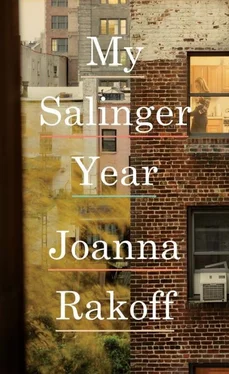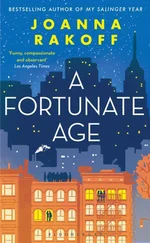And so I found myself, clad in my suit, handing over a hastily composed résumé to an elegant lady in a skirt and jacket rather similar to my own. “You just finished a master’s in English?” she asked, with a frown, her dark hair sliding into her face.
“Yes.”
“Well,” she said, sighing and putting my résumé down. “That will make you more appealing to some editors, less appealing to others. We’ll find you something, though.” She sat back in her chair. “I’ll give you a call in the New Year. No one’s hiring this close to Christmas.”
I’d barely made it home from her office when the phone rang. “I have something for you,” she said breathlessly. “How would you feel about working at a literary agency rather than a publisher?”
“Great,” I said. I had no idea what a literary agency was.
“Fantastic,” she said. “This is a wonderful agency. An old, venerable agency. I think it’s actually the oldest agency in New York. The job is with an agent who’s been in the business a long, long time.” She paused. “Some assistants have found her a bit difficult to work for, but others love her. I think you’d be a good match. And she’s looking to hire someone right away. She wants to make a decision before Christmas.” Later, I would discover that the agent in question had been interviewing potential assistants for months. But for now, on this cold day in December, I tucked the phone into my neck and hung my suit up in the shower to steam out the wrinkles.
The next day, zipped and buttoned back into my suit, I took the train down to Fifty-First and Lex, then walked across Park and over to Madison, to meet with the agent in question.
“So,” she said, lighting a long brown cigarette, a gesture that somehow reminded me simultaneously of Don Corleone and Lauren Bacall. Her fingers were long, slender, white, with nonexistent knuckles and perfectly shaped ovoid nails. “You can type?”
“I can,” I affirmed, shaking my head stiffly. I had been expecting more difficult questions, abstract inquiries into my work ethic or habits, challenges to the central tenets of my master’s thesis.
“On a typewriter?” she asked, pursing her lips and letting out frills of delicate white smoke. Ever so slightly, she smiled. “It’s very different from using a”—her face went slack in disgust—“a computer .”
I nodded nervously. “It is,” I agreed.
An hour later, as the sky darkened and the city emptied for the holiday, I lay on the couch rereading Persuasion , hoping I’d never have to put that suit back on again, much less the stockings that went with it.
The phone rang once more. I had a job.
And so, on the first Monday after the New Year, I woke at seven, quietly showered, and made my way down the building’s crumbling stairs, only to find the world stopped: the street was covered in snow. I’d known, of course, that a blizzard was coming, or I suppose I’d known, for I didn’t own a television or a radio, and I didn’t traffic in circles where people talked excessively about the weather—we had larger, more important things to discuss; weather was something over which our grandmothers, our dull neighbors in the suburbs, obsessed. If I’d owned a radio, I would have known that the entire city was shut down, that the Department of Education had declared a snow day for the first time in almost twenty years, that up and down the coast people were dying or had died, trapped in cars, unheated houses, skidding on unplowed streets. The Agency utilized a phone tree system for emergency closures, wherein the president of the company—my boss, though I didn’t realize that this was her position until a few weeks into the job, for at the Agency all knowledge was assumed rather than imparted—would call the next in command, going down the Agency’s hierarchy, until the receptionist, Pam, and the various agents’ assistants, and the strange, sad messenger, Izzy, all knew not to come into work. Because it was my first day, I didn’t yet figure onto the grid of numbers.
Though the city was indeed in an actual state of emergency, my trains came quickly—the L from Lorimer Street, the 5 express from Union Square—and at 8:30 I found myself in Grand Central, where the various purveyors of coffee and pastries and newspapers were eerily shuttered. Walking north, I arrived in the Great Hall, with its graceful canopy of stars, my heels echoing on the marble floor. I’d made it halfway across the chamber—to the central information booth, where in high school I’d often met friends—before I realized why my shoes were making such a racket: I was alone, or nearly so, in a space always filled with the sound of hundreds, thousands of feet racing across the marble. Now, as I stood stock-still in the middle of it, the hall was silent. I had been the only entity generating noise.
At the station’s west side, I pushed open the heavy glass doors and stepped out into the freezing wind. Slowly, I made my way west through the deep snow on Forty-Third Street, until I encountered something even stranger than a silent, unpopulated Grand Central Station: a silent, unpopulated Madison Avenue. The streets had not yet been plowed. The only sound was the wind. An untouched mantle of snow stretched evenly from the shops on its east side to those on its west, marred by not a footprint, a candy wrapper, not even a leaf.
Trudging my way north, I found a trio of bankers running—or trying to run—through the heavy snow and shrieking with delight, their trench coats trailing behind them like capes. “Hey,” they called to me. “We’re having a snowball fight! Come on!”
“I have to go to work,” I told them. It’s my first day , I almost told them, then stopped myself. Better to pass as experienced, seasoned. I was one of them now.
“Everything’s closed,” they called. “Play in the snow!”
“Have a good day,” I called back and slowly made my way toward Forty-Ninth Street, where I located the narrow, unremarkable building that housed the Agency. The lobby consisted of a narrow hallway leading to a pair of creaky elevators. This was a building of insurance salesmen and importers of African carvings, of aging family doctors in solo practice and Gestalt therapists. And the Agency, which occupied the whole of a mid-level floor. Stepping off the elevator, I tried the door and found it locked. But it was only 8:45 and the office, I knew, didn’t open until 9:00. The Friday before Christmas, I’d been asked to stop by to sign some paperwork and pick up a few things, including a key to the front door. It seemed odd to me that they’d give a key to a complete stranger, but I’d dutifully put it on my key chain, right there in the creaky elevator, and now I pulled it out and let myself into the dark, silent office. I longed to inspect the books that lined the foyer but feared someone might arrive and find me engaged in behavior that would betray me as the grad student I so recently was. Instead I forced myself to walk past the receptionist’s desk, down the front hallway, with its rows of Ross Macdonald paperbacks, to turn right at the little kitchen area and walk through the linoleum-floored finance department, arriving at the east wing of the office, which held my new boss’s sanctum and the large antechamber where I would sit.
And there I sat, spine erect, feet freezing in my soaked shoes, inspecting the contents of my new drawers—paper clips, stapler, large pink index cards imprinted with mysterious codes and grids—afraid to pull out my book, lest my new boss happen upon me. I was reading Jean Rhys and fancied myself akin to her impoverished heroines, living for weeks on nothing but the morning croissant and café crème provided by their residence hotels, the rents on which were, in turn, provided by their married ex-lovers, as compensation for ending their affairs. I suspected my boss would not approve of Jean Rhys. During our interview, she’d asked me what I was reading, what I preferred to read. “Everything,” I told her. “I love Flaubert. I just finished Sentimental Education and I was amazed by how contemporary it seemed. But I also love writers like Alison Lurie and Mary Gaitskill. And I grew up reading mysteries. I love Donald Westlake and Dashiell Hammett.”
Читать дальше












